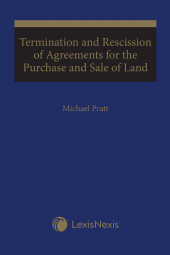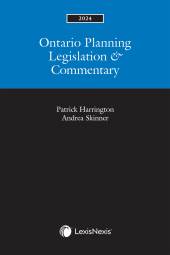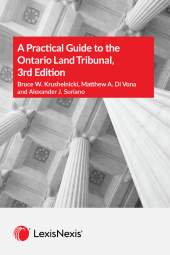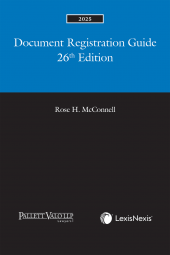Termination and Rescission of Agreements for the Purchase and Sale of Land
**2nd Place Winner of the 2023 Walter Owen Book Prize awarded by the Canadian Foundation for Legal Research**
Real estate practitioners will find this new text immensely useful. It provides a comprehensive look at the law that governs the termination and rescission of purchase and sale agreements.
One Year Subscription Only Terms
Subscribers receive the product(s) listed on the Order Form and any Updates made available during the annual subscription period. Shipping and handling fees are not included in the annual price.
Subscribers are advised of the number of Updates that were made to the particular publication the prior year. The number of Updates may vary due to developments in the law and other publishing issues, but subscribers may use this as a rough estimate of future shipments. Subscribers may call Customer Support at 800-833-9844 for additional information.
Subscribers may cancel this subscription by: calling Customer Support at 800-833-9844; emailing customer.support@lexisnexis.com; or returning the invoice marked 'CANCEL'.
If subscribers cancel within 30 days after the product is ordered or received and return the product at their expense, then they will receive a full credit of the price for the annual subscription.
If subscribers cancel between 31 and 60 days after the invoice date and return the product at their expense, then they will receive a 5/6th credit of the price for the annual subscription. No credit will be given for cancellations more than 60 days after the invoice date. To receive any credit, subscriber must return all product(s) shipped during the year at their expense within the applicable cancellation period listed above.
Détails des produits
**2nd Place Winner of the 2023 Walter Owen Book Prize awarded by the Canadian Foundation for Legal Research**
When is a party permitted to terminate an agreement for the purchase and sale of land before closing? In what circumstances can a party rescind such an agreement before the deal closes? When is rescission available after closing? Expert author and academic Michael Pratt provides comprehensive answers these questions in this new publication, Termination and Rescission of Agreements for the Purchase and Sale of Land.
Insightful Analysis
This book examines when the law will allow a party to terminate or to rescind an agreement for the purchase and sale of land. Written by a law professor with more than 20 years’ experience and expertise in the fields of contract law and the law of remedies, Termination and Rescission of Agreements for the Purchase and Sale of Land discusses when termination and rescission are available in response to certain events, including breach of the agreement, title deficiencies, repudiation, misrepresentation, non-disclosure, and non-fulfilment of conditions precedent. By using general contractual and remedial principles to analyze and explain these issues, this text fills a gap left by other books, which often examine the remedies available to buyers and sellers of land largely in isolation from broader common law principles.
Combining rigorous analysis with frequent examples drawn from cases across Canada to illuminate how the courts understand and apply the relevant doctrines, Pratt provides the most thorough treatment available of the law that governs this complex topic.
Termination and Rescission of Agreements for the Purchase and Sale of Land will be an invaluable resource for members of the real estate bar in all of the Canadian common law provinces. This book will also be useful to other legal professionals whose work involves land transactions, and to judges and academics interested in the field of real estate law. Finally, it will be an excellent addition to law library collections across the country.
Table des matières
Chapter 1 – Conditional Agreements of Purchase and Sale
§ 1.01 Conditional agreements of purchase and sale
§ 1.02 Discretionary conditions
§ 1.03 Agreements subject to lawyer’s approval
§ 1.04 Obligations in support of conditional bargains
§ 1.05 Conditions known to be unsatisfiable
§ 1.06 Waiver of conditions
Chapter 2 – Termination for Breach
§ 2.01 Termination for breach
§ 2.02 Title and time promises examined separately
§ 2.03 Conditions, warranties and innominate terms
§ 2.04 Uneven recognition of innominate terms in real estate cases
§ 2.05 Terms are innominate by default
§ 2.06 Warranties
§ 2.07 Conditions
§ 2.08 Innominate terms and fundamental breach
§ 2.09 Justifying termination on alternative or after-discovered grounds
Chapter 3 – Termination for Repudiation
§ 3.01 Scope of the chapter
§ 3.02 Repudiation defined
§ 3.03 Repudiation and its consequences
§ 3.04 Repudiatory contract
Chapter 4 – Termination for Late Performance
§ 4.01 Late performance and time of the essence
§ 4.02 Time is of the essence is strictly applied
§ 4.03 When is time of the essence?
§ 4.04 Ready, willing and able to perform
§ 4.05 Double default
§ 4.06 Limits on the power to invoke time of essence
§ 4.07 Variation, estoppel, election and waiver
§ 4.08 Time of the essence after expiry of a deadline
Chapter 5 – Title Problems
§ 5.01 Title promises are governed by distinct principles
§ 5.02 No duty to disclose title defects
§ 5.03 Title defects discovered after closing: Error in substantialibus
§ 5.04 Timely objections to title problems
§ 5.05 Good or marketable title defined
§ 5.06 Doubtful title
§ 5.07 Defective title: A question of materiality
§ 5.08 Patent or known title defects
§ 5.09 Matters of conveyance must be cleared from title
§ 5.10 Unmarketable title and unmarketable land
§ 5.11 The annulment power
Chapter 6 – Misrepresentation
§ 6.01 Scope of the chapter
§ 6.02 Actionable misrepresentation
§ 6.03 Statements of fact
§ 6.04 Statements of opinion
§ 6.05 Statements about the future
§ 6.06 Statements of law
§ 6.07 Misleading statements of fact
§ 6.08 Reliance on the representation
§ 6.09 Materiality
§ 6.10 Entire-agreement clauses
§ 6.11 Fraudulent misrepresentation
§ 6.12 Misrepresentations by agents
Chapter 7 – Non-Disclosure and Concealment of Defects
§ 7.01 Caveat emptor and defects of quality
§ 7.02 What is a defect?
§ 7.03 Concealment of a defect
§ 7.04 No general duty to disclose defects
§ 7.05 Latent and patent defects
§ 7.06 What latent defects must be disclosed?
§ 7.07 The basis of liability for non-disclosure of a defect
Chapter 8 – Rescission
§ 8.01 The nature of the remedy
§ 8.02 Reasons for denial of rescission
Chapter 9 – Election
§ 9.01 A choice between inconsistent alternatives
§ 9.02 Election, choice and knowledge
§ 9.03 Communication
§ 9.04 Elections by conduct
§ 9.05 Contracting-out of election
§ 9.06 Delay in making the election
Table of Cases
Index
 Lexis Nexis
Lexis Nexis 



